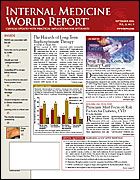Publication
Article
Internal Medicine World Report
"Cell Suicide" Potent Mechanism of New Anti-Cancer Drug Class
Author(s):
From the American Society of Clinical Oncology
ATLANTA?An experimental compound that can selectively induce apoptosis (programmed cell death) in aggressive cancer cells while sparing normal cells is being developed to treat a broad range of malignancies, according to data released at the American Society of Clinical Oncology annual meeting.
Scientists across the country are evaluating the novel agent, called human Apo2L/TRAIL, in patients with advanced non?small-cell lung cancer, melanoma, sarcoma, and cancers of the colon, prostate, ovary, and breast, as well as leukemia and lymphoma.
In an ongoing phase 1 study, the drug produced only minimal side effects in 58 treated patients, according to lead investigator Roy S. Herbst, MD, PhD, professor and chief, Section of Thoracic Medical Oncology, University of Texas, M.D. Anderson Cancer Center, Houston, 1 of 5 centers conducting the studies. He noted that this was the first time the experimental drug was tried in humans.
"Although this was a safety study, Apo2L/TRAIL shrank or stabilized tumors in more than half the patients," Dr Herbst said.
For 5 consecutive days every 3 weeks, the participants received up to 8 cycles of the intravenous drug at dosages of 0.5 to 15 mg/kg, according to Dr Herbst.
"While these findings are preliminary?for example, we still don't know the optimal dose that will treat patients and still be well tolerated?we may have an exciting new class of targeted agents aimed at a variety of advanced cancers. The treatment is designed to activate pathways inside tumor cells that lead those cells to self-destruct," he explained.
In nature, apoptosis eliminates damaged or unneeded cells by a normal process of programmed suicide. This self-regulatory process is silenced in cancer cells, giving them a kind of immortality that allows them to flourish.
Investigative recombinant human Apo2L/TRAIL is a soluble human protein designed to activate 2 proapoptotic receptors, DR4 and DR5. "These so-called ?death receptors' are located on the surface of all cells and are believed to be especially numerous on cancer cells," Dr Herbst noted. "Apo2L/ TRAIL is the only agent of its kind that can activate both DR4 and DR5; they then mount an immune response to attack the tumor cells."
He postulates that in the future, Apo2L/TRAIL and other new DR4 and DR5 treatments will work best when used with chemotherapy or radiation, explaining that "such research [using combinations] will proceed when the current dose escalation study is completed."
Therapies that may be able to induce apoptosis and have the potential to treat many kinds of cancers are considered so promising that 2 major biotechnology companies, Amgen and Genentech?usually fierce competitors?have become partners in the development of the drug, according to Dr Herbst.
"Together they identified and cloned the Apo2L/TRAIL gene and used its protein product to create a recombinant protein?a double of the natural ligand that binds onto the 2 death receptors," he said.





